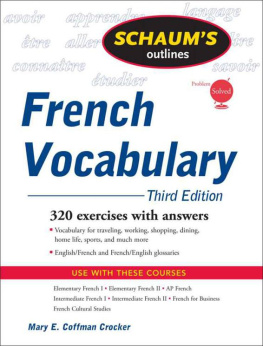SCHAUMS outlines
German Vocabulary
Third EditionEdda WeissConrad J. SchmittFormer Editor-in-Chief
Foreign Language Department, McGraw-HillLois M. Feuerle, Ph.D.
Former Coordinator of Court Interpreting Services
New York Unified Court SystemChristine EffertzFormer Adult Education Program Instructor
Volkshochschule Ravensberg, Halle, Bielefeld, GermanySchaums Outline Series

Copyright 2010, 1999, 1986 by The McGraw-Hill Companies, Inc. All rights reserved. Except as permitted under the United States Copyright Act of 1976, no part of this publication may be reproduced or distributed in any form or by any means, or stored in a database or retrieval system, without the prior written permission of the publisher.
ISBN: 978-0-07-161548-8 MHID: 0-07-161548-2 The material in this eBook also appears in the print version of this title: ISBN: 978-0-07-161547-1, MHID: 0-07-161547-4. All trademarks are trademarks of their respective owners. Rather than put a trademark symbol after every occurrence of a trademarked name, we use names in an editorial fashion only, and to the benefit of the trademark owner, with no intention of infringement of the trademark. Where such designations appear in this book, they have been printed with initial caps. McGraw-Hill eBooks are available at special quantity discounts to use as premiums and sales promotions, or for use in corporate training programs. TERMS OF USE This is a copyrighted work and The McGraw-Hill Companies, Inc. (McGraw-Hill) and its licensors reserve all rights in and to the work. (McGraw-Hill) and its licensors reserve all rights in and to the work.
Use of this work is subject to these terms. Except as permitted under the Copyright Act of 1976 and the right to store and retrieve one copy of the work, you may not decompile, disassemble, reverse engineer, reproduce, modify, create derivative works based upon, transmit, distribute, disseminate, sell, publish or sublicense the work or any part of it without McGraw-Hills prior consent. You may use the work for your own noncommercial and personal use; any other use of the work is strictly prohibited. Your right to use the work may be terminated if you fail to comply with these terms. THE WORK IS PROVIDED AS IS. McGRAW-HILL AND ITS LICENSORS MAKE NO GUARANTEES OR WARRANTIES AS TO THE ACCURACY, ADEQUACY OR COMPLETENESS OF OR RESULTS TO BE OBTAINED FROM USING THE WORK, INCLUDING ANY INFORMATION THAT CAN BE ACCESSED THROUGH THE WORK VIA HYPERLINK OR OTHERWISE, AND EXPRESSLY DISCLAIM ANY WARRANTY, EXPRESS OR IMPLIED, INCLUDING BUT NOT LIMITED TO IMPLIED WARRANTIES OF MERCHANTABILITY OR FITNESS FOR A PARTICULAR PURPOSE.
McGraw-Hill and its licensors do not warrant or guarantee that the functions contained in the work will meet your requirements or that its operation will be uninterrupted or error free. Neither McGraw-Hill nor its licensors shall be liable to you or anyone else for any inaccuracy, error or omission, regardless of cause, in the work or for any damages resulting there from. McGraw-Hill has no responsibility for the content of any information accessed through the work. Under no circumstances shall McGraw-Hill and/or its licensors be liable for any indirect, incidental, special, punitive, consequential or similar damages that result from the use of or inability to use the work, even if any of them has been advised of the possibility of such damages. This limitation of liability shall apply to any claim or cause whatsoever whether such claim or cause arises in contract, tort or otherwise.
Preface to the Third Edition
Much has happened in the German-speaking world in the decade since the second edition of
Schaums Outline of German Vocabulary was published in 1999.
Memories of the former German Democratic Republic are fading, and the Federal Republic of Germany remains a major economic force. Germany and Austria, together with 13 other European Union member countries, have abandoned their old currencies, the German Mark (DM) and the Austrian Schilling (S), in favor of the Euro, while non-EU members Switzerland and Liechtenstein continue to use the Swiss Franc (SFR) as their common currency. But for the student of language, it is the controversial German Orthographic Reformdie deutsche Rechtschreibreformthat may be the most important change since the second edition. On July 1, 1996, the representatives of the four German-speaking countries, Germany, Austria, Switzerland, and Liechtenstein, signed an international agreement to introduce the new spelling by August 1, 1998. After a transition period marked by considerable resistance and debate that resulted in minor revisions, the German Orthographic Reform went into effect on August 1, 2006. The German Orthographic Reform addresses several important issues, the most significant of which is the endeavor to make German orthography reflect the sounds of spoken German more closely.
Other issues are capitalization, hyphenation, writing certain words separately or together, and punctuation. It should be reassuring to the student that some authorities estimate that about 90% of the changes mandated by the reform involve the letters ss and . Although the new spelling rules must be observed in German schools, a number of authors, publishers, and newspapers have chosen to continue to observe some version of the old rules. A simple tip-off as to whether a publication follows the old or the new rules is to find the German word for that introducing a subordinate clause (e.g.,  Ich wei, dass sie hier ist vs. Ich wei, da sie hier ist). da (old). Schaums Outline of German Vocabulary follows the new rules. Schaums Outline of German Vocabulary follows the new rules.
Ich wei, dass sie hier ist vs. Ich wei, da sie hier ist). da (old). Schaums Outline of German Vocabulary follows the new rules. Schaums Outline of German Vocabulary follows the new rules.
For a reference work that presents and illustrates the new rules, consult Duden, Die Deutsche Rechtschreibung (ed. 24, vol. 1, Dudenverlag, 2006). This work provides a comprehensive list of 130,000 entries, showing the preferred and acceptable spellings and, importantly, highlighting the differences between the old and the new. In all other respects, the goals of this new edition of Schaums Outline of German Vocabulary remain the same as those of the preceding edition. Lois M.
FEUERLE
CHRISTINE EFFERTZ
Preface to the Second Edition
The purpose of this book is to provide the user with words in contextthe vocabulary that is needed to converse meaningfully and effectively in everyday situations about everyday topics. Although the book contains a review of many common basic words that the user has no doubt already encountered in his or her study of German up to now, the aim of
Schaums Outline of German Vocabulary is to enrich the students knowledge of the language by presenting words that seldom appear in typical language-learning textbooks, but which are essential in order to communicate comfortably in a given situation. Unlike a typical bilingual dictionary,
Schaums Outline of German Vocabulary introduces each word in context in easy-to-remember subject matter groupings and then manipulates the context in illustrative sentences and exercises so that the user can make each word his or her own. Because words often have a range of meanings and because perfect one-for-one equivalence is rare between two languages, as the user becomes more and more familiar with German, he or she will discover that the words we have glossed for the situations presented in this book might have other meanings when used in different contexts. This should not be a cause for uneasiness on the part of the student; it is a sign that the students knowledge of German is growing and becoming deeper. The content of each chapter is focused on a real-life situation, such as making a telephone call, traveling by plane, staying at a hotel, or using a computer.





 Copyright 2010, 1999, 1986 by The McGraw-Hill Companies, Inc. All rights reserved. Except as permitted under the United States Copyright Act of 1976, no part of this publication may be reproduced or distributed in any form or by any means, or stored in a database or retrieval system, without the prior written permission of the publisher.
Copyright 2010, 1999, 1986 by The McGraw-Hill Companies, Inc. All rights reserved. Except as permitted under the United States Copyright Act of 1976, no part of this publication may be reproduced or distributed in any form or by any means, or stored in a database or retrieval system, without the prior written permission of the publisher.  Ich wei, dass sie hier ist vs. Ich wei, da sie hier ist). da (old). Schaums Outline of German Vocabulary follows the new rules. Schaums Outline of German Vocabulary follows the new rules.
Ich wei, dass sie hier ist vs. Ich wei, da sie hier ist). da (old). Schaums Outline of German Vocabulary follows the new rules. Schaums Outline of German Vocabulary follows the new rules.